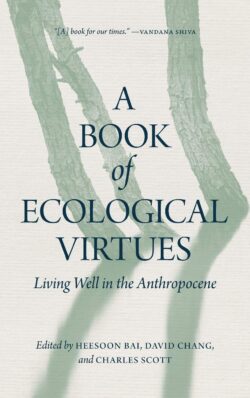#977 Tips for the Anthropocene
A Book of Ecological Virtues: Living Well in the Anthropocene
by Heesoon Bai, David Chang, and Charles Scott (editors)
Regina: University of Regina Press, 2020
$39.95 / 9780889777569
Reviewed by Rose Morrison
*
 Seldom has this reviewer encountered an essay collection that is so topical and as important as A Book of Ecological Virtues: Living Well in the Anthropocene. Given that “humanity has reached the point of fouling its own nest and imperilling the basis of life on earth.” Editors Heesoon Bai, David Chang, and Charles Scott ask, what are the changes that must be made in the way that we live; and what are the virtues that we must cultivate? The diverse contributors to this book offer perspectives from their own academic disciplines and practices; and suggestions based on ancient, classical and indigenous wisdom, and philosophies, religion, and ethics.
Seldom has this reviewer encountered an essay collection that is so topical and as important as A Book of Ecological Virtues: Living Well in the Anthropocene. Given that “humanity has reached the point of fouling its own nest and imperilling the basis of life on earth.” Editors Heesoon Bai, David Chang, and Charles Scott ask, what are the changes that must be made in the way that we live; and what are the virtues that we must cultivate? The diverse contributors to this book offer perspectives from their own academic disciplines and practices; and suggestions based on ancient, classical and indigenous wisdom, and philosophies, religion, and ethics.

Nancy Turner and Darcy Mathews start the conversation by acknowledging the connectedness and reciprocity of Indigenous people with the rest of creation (both physical and spiritual) and they propose these ecological virtues: responsibility, respect, gratitude, caring, love, and generosity. Contributor Peter Kahn writes that interaction with nature can bring perceptions that lead to ecological presence. He cites the proved benefits of such interaction; and Asian philosophies that embrace presence, being, and attention. For him, ecologic presence through interactions with nature is a virtue aligned with the theory of good.

Jan Zwicky frames part of her essay with the story of Socrates on the day of his death. The ship in which Theseus once went to Crete has been sighted on its return from Delos. Because of a promise Theseus made to the god Apollo, postponed executions can resume when the ship docks later that day. She likens Socrates’ situation to the predicament of humans teetering on the edge of environmental catastrophe. What virtues do we need to cultivate? How should we live good lives? She answers that virtue in the face of ecological crisis is the same as virtue has always been. “We should approach the coming cataclysm as we ought to have approached life.” She endorses the Socratic virtues of wisdom (to know what’s what; be aware, be humble); self-control; courage; and justice. She adds compassion, as Socrates was compassionate to his friends as his death approached, and contemplative practice or attention.

Several other contributors also use narrative effectively. Both Douglas Christie, “Never Weary of Gazing,” and David Chang, “Worthy of This Mountain,” tell of their adult sublime experiences in nature which brought each of them back into community with the ecosystem. Christie writes of being transported while building a miniature house on the beach with his then young child: “It is a moment almost out of time in which you behold, as if of new, the world itself. A moment of original innocence.” Chang finds himself transported while gazing at a mountain: “I stood in rapture, at once breathless and bursting with gratitude. … How will I live a life that is worthy of this mountain?”

Storytelling, that traditional way of teaching, learning, and sharing experiences, is ever powerful. Connectedness with the ecosystem is key to Daoist tradition; and Paul Crowe (“What are “Daoist” virtues?”) traces the evolution of Daoism through teachers, texts, and stories. For followers, it is through the incorporation of the essential life force qi, that a person can become a sage: someone highly accomplished, in good health, and gaining true wisdom. Qi is also the vital force that occasions and sustains virtue. Crowe illuminates his essay with the simple, to-the-point story of an ancient Daoist Celestial Master’s response to his troubled student, who worries about the pain that humans cause earth; and the repercussions of this abuse:
“I am a lowly, stupid worthless student,” the anxious disciple begins. The master replies:
“True person, simply sit calmly and listen clearly. What greatly pains sky and earth is evil people failing to go along with [them] and failing to be filial. Now the balance of sky and earth is entirely [composed of] three qi and they are joined together as a single family.”
“… together they regulate life and together they nourish the ten thousand creatures. Sky [father] directs life… Earth [Mother] directs nourishing… Human beings direct patterns [around them] and are called children…”
This story highlights the virtues that Crowe suggests: humility, composure, knowing (understanding and accepting humans’ place), attention, and contemplation. Readers will find a similar calming, teaching story in David Loy’s “The Ecological Virtues of Buddhism.”

Thomas Falkenberg, in “The Ethic of Sustainable Well-being and Well-becoming” succinctly defines sustainable development of the ecosystem as development toward an expansion of its adaptive capability in response to perturbations. He writes that striving for well-being is at the heart of human life concerns, and that voluntary simplicity, defined by an ethic of sustainable well-being, rates as a virtue. It could also be understood as temperance, while living a life of consumption would be considered a vice within that ethic. Zwicky concurs that humans can make a difference by lowering their consumption: “People can do more than petition government; they can live simply.” Mike Hannis, in “Why virtue is Good for You” defends a eudaiminist version of environmental ethics; that is, a version in which ecological virtues are considered virtues because by possessing and using them, they contribute to the flourishing of the person who has them. His argument is balanced and well-researched. He calls for a temperance that would avoid the possible arrogance of both complete ecocentrism and extreme anthropocentrism.


David Jardine’s “Owning up to Being an Animal: On the Ecological Virtues of composure” is a witty, entertaining read. We must own up, he writes, to being an animal, a creature of the earth that suffers, that has foibles. Owning up involves admitting that we are driven by panic, caught in a positive feedback loop that does not allow for thought of ecological virtue. We need to compose ourselves. Jardine offers composure of composition and of writing as an ecological virtue, and he plays cleverly with those terms. He uses writing and composition as a path to composure. “To compose myself, I surround myself with composers (poets, writers) who can read my life back to me from beyond my own distraction and frailty.” He practises writing and composition “as a way to face the fix we’re in.” We must be well composed in the virtue of composure.

Recounting childhoods spent close to the land, but in different cultures, Tommy Akulukjuk, Nigora Erkaeva, Derek Rasmussen, and Rebecca Martusewicz call for a recommitment to each other and the land, as they tell “Stories of Love and Loss.” All were educated by family and community, acquiring virtues such as environmental respect, humility, and composure along the way; practising daily values such as sharing, caring; and learning the purpose and interconnections of all their actions. Akulukjuk contrasts this to his western education, which discounted his father’s wisdom and denigrated the Inuit culture that nurtured him. Erkaeva and Martusewicz report similar experiences. All contributors to this essay experienced both kinds of education: a formal one based on preparation work or university, and an informal one based on ecological values. This is not the only essay in this collection to criticize formal western educational systems.

Derek Rasmussen, the final contributor to “Tales of Love and Loss” invokes the Buddha’s saying, “Cease to do evil (then learn to do good).” Activism is essential. He lists needed local virtues as generosity, humility, fortitude, kindness, determination, and forgiveness. Compassionate action, (“walking the walk”) is implied by some contributors and specifically mentioned by others such as Chang, who refers to individual behaviours such as not using fossil fuels, and Loy, who notes that requirements for compassion toward the entire, interdependent ecosystem, and selfless acts to ease suffering are included in early Buddhist texts. Currently, the ecosattva path, which combines personal contemplation with activism, is reviving that tradition.

“To imagine a changed reality of loving, responsible being, we must first speak our world … as if it is a place of love,” writes Margaret McKeon. Poetry, she adds, is “a virtue that lingers in intimacy to know a broader world completely.” “Evoking Ethos: A Poetic Love Note to Place” is a conversation between McKeon and fellow poet Carl Leggo on the importance of home and place, and on humans’ responsibility to love and protect that place for future generations. Both poets lived for many years in Cornerbrook, Newfoundland, and their poems show that they are still immersed in its essence and memories.

Poets, writes McKeon, take on “this task of world-creation, of this love note to place, as a sacred task.” Leggo, like Jardine, finds that poetry nurtures composure; and poems call out in activist, creative, transformative, and passionate voices. He is right, for good poets are the prophets of the community: in beautiful and distilled language they summon people to pay heed. “Evoking Ethos: A Poetic Love Note to Place” is both inspiring and grounding. Its poems emphasize the importance of attention to the place where we belong, for example Leggo’s “Rooted:”
I am reminded of Newfoundland
And always the diligent psychologist
Bob said, That’s rather egocentric,
and I said No, I think it’s geocentric.

A Book of Ecological Virtues asks the question, how do we live well in the Anthropocene? And the knowledgeable contributors respond, suggesting the values and virtues that will help in this time of ecological crisis. The focus is on living; but Zwicky ends her essay by asking how we should die. She suggests it should be with a Socratic light touch, not taking ourselves too seriously. David Greenwood and Margaret McKee, in “Thanatopsis: death literacy for the living,” concur. They advocate more recognition, understanding, and acceptance of death in a world that is now both death-obsessed and death averse. They name death literacy a necessary ecological virtue: being silent about death neither prevents suffering nor helps link humans to the rest of creation. These writers describe being open and accepting of death as acts of unity and humility. Death literacy can encourage empathy and compassionate action.
This review of A Book of Ecological Virtues highlights some essential parts of the essays. It is not comprehensive. It does not, for example, mention essayists’ comments on the capitalist-consumption continuum, or those on poverty; nor does it detail theories on which some contributors have developed their essays. This well-researched, well-written, and pertinent essay collection invites new conversations. It needs to be read, savoured and shared.
*

Rose Morrison lives and writes in British Columbia’s bounteous Fraser Valley. She has a large, somewhat dysfunctional family that she loves dearly; and she has always been in awe of the earth. Rose enjoys good friends, walking, travelling and reading. She likes writing poetry and creative non-fiction. Her ongoing project is to convince her long-in-progress novella and her current poetry collection to finish themselves. She remains pleasantly surprised to be professor emerita in the Agriculture Technology Department of the University of the Fraser Valley. Editor’s note: previously for The Ormsby Review, Rose Morrison has reviewed books by Pauline Daniel, Michael Ableman, Collin Varner, and Dorothy Kirk.
*
The Ormsby Review. More Books. More Reviews. More Often.
Publisher and Editor: Richard Mackie
The Ormsby Review is a journal service for in-depth coverage of B.C. books and authors. The Advisory Board consists of Jean Barman, Robin Fisher, Cole Harris, Wade Davis, Hugh Johnston, Patricia Roy, David Stouck, and Graeme Wynn. Scholarly Patron: SFU Graduate Liberal Studies. Honorary Patron: Yosef Wosk. Provincial Government Patron since September 2018: Creative BC
“Only connect.” – E.M. Forster